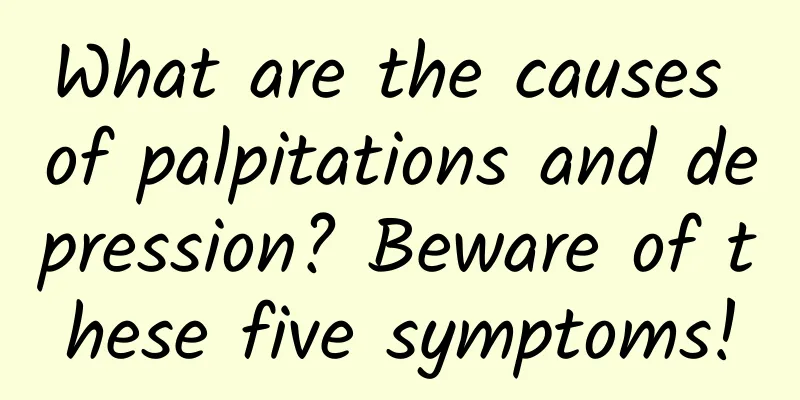What are the causes of palpitations and depression? Beware of these five symptoms!

|
Panic depression is also called depressive disorder. The most obvious feature is low mood and extremely bad emotions. Severe negative emotions start from melancholy to grief, inferiority and depression, and finally pessimism, world-weariness and suicidal thoughts. So, what causes panic depression? What are the symptoms? Causes So far, the cause of depression is still unclear, but it is certain that many factors including biology, psychology and social environment are involved in the pathogenesis of depression. Biological factors mainly involve genetics, neurobiochemistry, neuroendocrine, neural regeneration and other aspects; psychological susceptibility factors closely related to depression are premorbid personality traits, such as depressive temperament. Encountering stressful life events in adulthood is an important triggering condition for the occurrence of clinically significant depressive episodes. However, the above factors do not work alone. At present, it is emphasized that the interaction between genetics and environmental or stress factors, as well as the timing of the occurrence of this interaction, have an important influence on the occurrence of depression. Clinical manifestations 1. Panic The main manifestations are significant and lasting emotional depression, pessimism. Mild cases are unhappy, unhappy, and have a loss of interest. Severe cases are in agony, pessimistic, and desperate. The depressed mood of typical patients has a rhythmic change from heavier in the morning to lighter at night. On the basis of the depressed mood, the patient will have a lower self-evaluation, a sense of uselessness, hopelessness, helplessness, and worthlessness, often accompanied by self-blame and guilt. Severe cases have delusions of guilt and hypochondria, and some patients may have hallucinations. 2. Slow thinking The patient's thinking speed is slow, reaction is slow, and thinking is blocked. He feels that "the brain is like a rusty machine" and "the brain is like a layer of paste". Clinically, active speech is reduced, the speed of speech is significantly slowed down, the voice is low, and it is difficult to answer. In severe cases, communication cannot be carried out smoothly. 3. Decreased volitional activity The patient's volitional activities show significant and lasting inhibition. Clinically, the patient behaves slowly, lives passively and lazily, does not want to do things, is unwilling to contact and interact with people around him, often sits alone, or stays in bed all day, lives alone with the door closed, alienates relatives and friends, and avoids socializing. In severe cases, even physiological needs such as eating and drinking and personal hygiene are ignored, and the patient is unkempt and unkempt, and even develops into silence, immobility, and refusal to eat, which is called "depressive stupor." However, after careful mental examination, the patient still reveals painful depression. Patients with anxiety may have symptoms such as restlessness, finger grasping, rubbing hands and feet, or pacing. Severe patients are often accompanied by negative suicidal ideas or behaviors. Negative and pessimistic thoughts, self-blame and self-guilt, and lack of self-confidence can lead to despair, believing that "ending one's life is a kind of liberation" and "one is superfluous in the world", and can lead to suicide attempts developing into suicide behaviors. This is the most dangerous symptom of depression and should be watched out for. 4. Impairment of cognitive function Studies have shown that patients with depression have cognitive impairment. The main manifestations are decreased recent memory, attention disorders, prolonged reaction time, increased alertness, poor abstract thinking ability, learning difficulties, poor language fluency, spatial perception, eye-hand coordination, and decreased thinking flexibility. Cognitive impairment leads to social dysfunction in patients and affects their long-term prognosis. 5. Physical symptoms The main symptoms are sleep disorders, fatigue, loss of appetite, weight loss, constipation, pain in any part of the body, loss of libido, impotence, amenorrhea, etc. Complaints of physical discomfort may involve various organs, such as nausea, vomiting, palpitations, chest tightness, sweating, etc. Symptoms of autonomic nervous dysfunction are also common. The main complaints of pre-illness physical diseases are usually aggravated. Sleep disorders are mainly manifested as early awakening, generally 2 to 3 hours earlier than usual, and inability to fall asleep again after waking up, which is characteristic of depressive episodes. Some show difficulty falling asleep and shallow sleep; a small number of patients show excessive sleep. Weight loss is not necessarily proportional to loss of appetite. A small number of patients may have increased appetite and weight gain. Prevention A 10-year follow-up study of depression patients found that 75% to 80% of patients had multiple relapses, so patients with depression need preventive treatment. Patients with more than three episodes should receive long-term treatment or even lifelong medication. Most scholars believe that the dosage of maintenance medication should be the same as the treatment dosage, and regular outpatient follow-up observations should also be conducted. Psychological treatment and social support systems also play a very important role in preventing the recurrence of this disease. They should try their best to relieve or reduce the patient's excessive psychological burden and pressure, help the patient solve practical difficulties and problems in life and work, improve the patient's coping ability, and actively create a good environment for them to prevent recurrence. |
<<: Psychological treatment methods for depression help you face depression correctly
>>: Manifestations and common symptoms of major depression
Recommend
Does hematospermia require abstinence or blood discharge?
Patients with ejaculation bleeding are mainly cau...
What to do if you have acne in summer? Tips to get rid of acne in summer
Acne is a very annoying thing. Whether it is for ...
How to detect HPV virus in men
Generally, the HPV virus targets women. Long-term...
What are the folk remedies for treating premature ejaculation?
The common method of treating premature ejaculati...
How to determine whether the glans penis is necrotized
The distribution of blood vessels and nerves on t...
At what age do men reach menopause?
Now we know something about menopause. After meno...
How can a 48-year-old man improve his sexual ability?
I believe many friends will agree that a 48-year-...
Frequent urination, urgency, testicular swelling and pain
Even if you are lucky and have never been kicked,...
Treatment of the consequences of kidney deficiency in men
It is not uncommon for men to have problems with ...
What causes itchy glans?
Itching of the glans penis is a symptom of galact...
Why does one testicle hurt?
Testicles are male reproductive organs, but few m...
Can a short penis be cured?
The penis is the male reproductive organ. It play...
Sperm growth cycle
Everyone knows about sperm, but many people know ...
This is what causes male urethral pain
Many men often feel involuntary pain in their gen...
How can men improve their sexual ability through exercise?
The strength of sexual ability determines whether...









